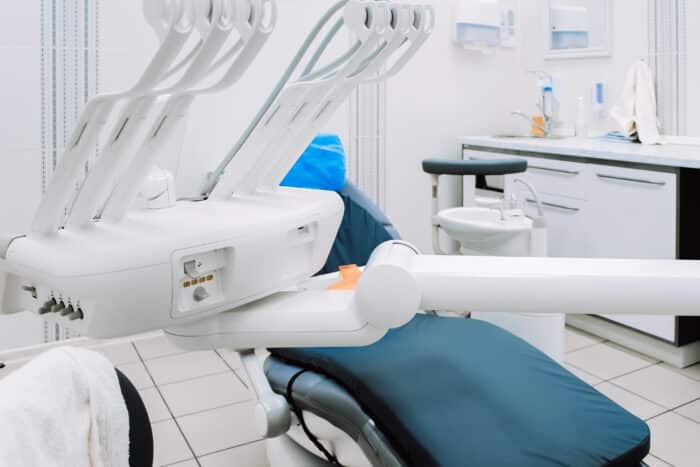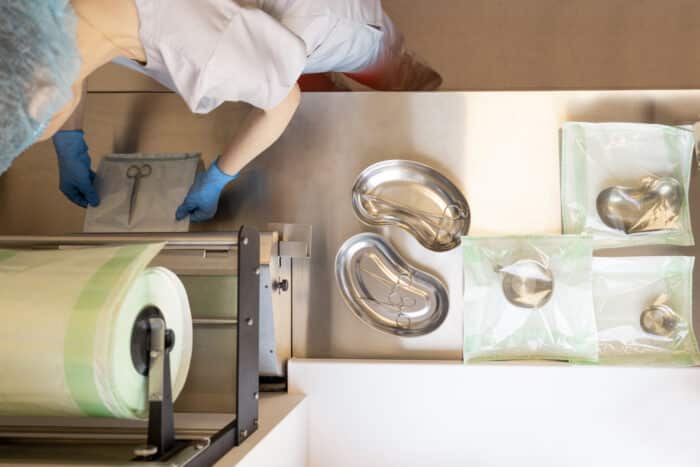You might have walked into a clinic or a hospital and seen the different types of instruments and tools being used. You might have also wondered who maintains and cleans these instruments and tools that are the basis of any treatment or surgery.
Well, there is a team of heroes behind the curtains that do that, and they are known as sterile processing technicians.
In this article, we will discuss everything about their duties, from cleaning surgical tools to keeping everything squeaky clean in hospitals.
So, read on for an interesting trip into the world of sterile processing!
See: What is a Sterile Processing Technician
Duties of a Sterile Processing Technician
The primary duty of a Sterile Processing Technician revolves around ensuring that medical instruments and equipment are clean, sterilized, and ready for use in procedures.
Here’s a detailed breakdown of their duties:
Cleaning and Decontamination:
This step is the foundation of the entire process. These technicians thoroughly clean instruments, removing any visible debris and contaminants. This initial cleaning is important as it sets the stage for effective sterilization. A thorough cleaning ensures that instruments can be properly sterilized, reducing the risk of infections or complications during medical procedures.
Sterilization Processes:
After cleaning, instruments move to the sterilization phase. Sterile Processing Techs operate specialized equipment like autoclaves, which means setting the instruments to specific temperatures, pressures, and durations required to eliminate harmful microorganisms. This step is vital for ensuring that medical tools are safe for patient use, as it eradicates bacteria, viruses, and other pathogens that could cause infections.
Assembling and Packaging:
Once sterilized, SPTs then assemble instruments into sets or kits needed for medical procedures. Careful packaging is also essential to maintain the sterility of these items until they are required in surgeries or treatments. Proper packaging also ensures that the instruments can be easily accessed and used by healthcare professionals without compromising their cleanliness.
Quality Control:
Maintaining high-quality standards is extremely important in sterile processing. Technicians regularly test sterilization equipment, perform diagnostic checks, and use biological and chemical indicators to confirm the effectiveness of sterilization techniques. This ongoing quality control ensures that instruments consistently meet stringent safety and cleanliness standards.
Inventory Management:
SPTs play an important role in managing inventory and supplies. They track and organize instruments, ensuring that the necessary items are available and in good condition when required for medical procedures. This involves ordering, organizing, and restocking supplies to prevent shortages and maintain a smooth workflow in healthcare settings.
Following Protocols and Regulations:
Adherence to strict protocols and regulations is non-negotiable. SPTs follow established procedures and safety protocols meticulously to maintain aseptic environments. This minimizes the risk of contamination and helps maintain a high level of patient safety during medical procedures.
See: Certified Sterile Processing Technician
What Does a Day in the Life of a Sterile Processing Technician Look Like?
Now you know what the duties of a sterile processing technician include, so let’s move forward and highlight what a day in the life of these unsung heroes looks like.
A day in the life of a sterile processing technician is quite active and revolves around ensuring that medical instruments are properly cleaned, sterilized, and ready for use in healthcare procedures.
Let’s take a look at the breakdown:
Preparation and Setup:
– SPTs start their day by reviewing schedules and prioritizing tasks for the day.
– They prepare the work area, ensuring that cleaning and sterilization equipment are functioning correctly and ready for use.
Cleaning and Decontamination:
– Their day often begins with the cleaning phase, where these technicians carefully inspect, disassemble, and clean medical instruments using specialized equipment and cleaning solutions.
– They remove debris, blood, and other contaminants from the instruments to prepare them for sterilization.
Also read: Travel Sterile Processing Technician
Sterilization Processes:
– After cleaning the instruments, they move into the sterilization phase. Technicians load the sterilization equipment, such as autoclaves or sterilization machines, following specific protocols.
– They monitor and operate the equipment, ensuring that instruments are subjected to the correct temperature, pressure, and duration required for effective sterilization.
Assembling and Packaging:
– After sterilization, they assemble instruments into sets or kits based on procedure requirements.
– They carefully package the instruments, using techniques to maintain hygiene until they’re needed in surgeries or treatments.
Quality Control and Maintenance:
– Throughout the day, they perform quality checks on equipment and instruments.
– They conduct tests, run diagnostic checks, and use biological and chemical indicators to verify the effectiveness of sterilization processes.
Inventory Management and Organization:
– SPTs continuously manage inventory, ensuring that supplies are well-stocked and organized.
– They track instrument usage, reorder supplies as needed, and maintain records of inventory levels.
Adhering to Protocols and Collaboration:
– Throughout their day, they strictly follow the protocols and safety guidelines to maintain the hygiene standard.
– They also usually collaborate with other healthcare professionals to ensure instruments are readily available for procedures.
Skills Required to Become a Sterile Processing Technician
Like in any other profession in healthcare, pursuing a career in sterile processing requires some specific skills.
Let’s take a look at some of the skills you should incorporate into your resume if you want to become a successful Sterile Processing Tech:
- Attention to Detail: Being thorough is essential for properly cleaning, sterilizing, and handling delicate medical instruments.
- Technical Proficiency: Understanding how to operate and maintain various sterilization equipment and machinery is essential to be able to maintain its sterility.
- Adaptability: Being able to work in a fast-paced environment and adapt to different situations and tools is important for SPTs as they typically work in clinics or hospitals.
- Organization: Managing inventory, keeping track of supplies, and arranging instruments systematically is also important for efficiency and the smooth running of the clinic or hospital.
- Communication: Clear communication with healthcare staff regarding instrument availability and any other issues is crucial for seamless procedures.
- Problem-Solving: The ability to troubleshoot equipment issues and find solutions ensures continuous sterilization processes for Sterile Processing Techs.
- Adherence to Protocols: Strictly following safety protocols and guidelines to maintain a sterile environment and prevent infections is a must for these technicians.
- Teamwork: Being efficient in collaborating with other healthcare professionals to ensure instruments are available and ready for use during procedures is vital for these technicians.
- Critical Thinking: Being able to evaluate the effectiveness of sterilization processes and make adjustments as necessary.
Read more: Sterile Processing Technician School
Types of Healthcare Settings That Hire Sterile Processing Technicians
Now that you’ve read about what sterile processing techs do, you might be wondering what types of environments they work in, and how their duties vary according to each environment.
Let us answer that for you.
Sterile processing technicians work in various healthcare settings, and while their core duties remain similar, there are some differences in their responsibilities based on the setting, such as:
Hospitals:
In hospitals, sterile techs handle a wide range of instruments that are used across multiple departments, from surgical theatres to emergency rooms. They usually process a high amount and variety of instruments.
Larger hospitals might have specialized teams focusing on specific areas like surgery or emergency care, while smaller hospitals might have techs handling a broader range of instruments.
Surgical Centers:
These techs mainly handle instruments required for surgical procedures. Their work might be more specialized, focusing primarily on surgical tools.
Depending on the surgical center’s specialization (e.g., orthopedic, ophthalmic), the instruments and sterilization procedures can vary accordingly.
Clinics and Outpatient Facilities:
Sterile Processing Techs working here process instruments used in outpatient treatments and minor procedures.
Their duties might involve a smaller range of instruments and lower volume compared to hospitals or surgical centers.
Dental Offices:
Sterile techs in dental offices handle instruments specific to dental procedures.
The instruments used in dentistry differ from those in general healthcare settings, and these techs might focus on equipment particular to dental procedures.
Long-Term Care Facilities:
SPTs working in long-term care facilities handle instruments needed for basic medical care and minor procedures.
The amount of instruments processed might be lower compared to acute care settings, and the focus could be on maintaining a smaller inventory.
Read: Sterile Processing Technician Certification
Conclusion
Sterile processing technicians make sure every medical tool is super clean, protecting patients from getting sick.
They do lots of things, like cleaning and making sure everything follows strict rules. Even though they’re not always in the spotlight, their job is super important for keeping hospitals and clinics safe and clean.
See: How to Become a Sterile Processing Technician
Related Resources:
- Sterile Processing Technician Salary
- Sterile Processing Technician Requirements
- Sterile Processing Technician Resume
- Sterile Processing Technician vs. Surgical Technologist
- Sterile Processing Technician School
- Sterile Processing Technician Course
- Sterile Processing Technician Training Program Cost
- CRCST Certification
Related Articles
-
How to Be Successful in College in 2022 – 7 Simple Tips to Succeed
-
How Do Scholarships Work? Read This First…Truth is Shocking
-
7 Best College Majors 2024: What Should I Major In?
-
How to Choose a College – 10 Things You Must Consider in 2024
-
Why Go to College? Top 13 Benefits for Adult Students in 2022
-
Top 5 Best Alternatives to Community College for 2024








